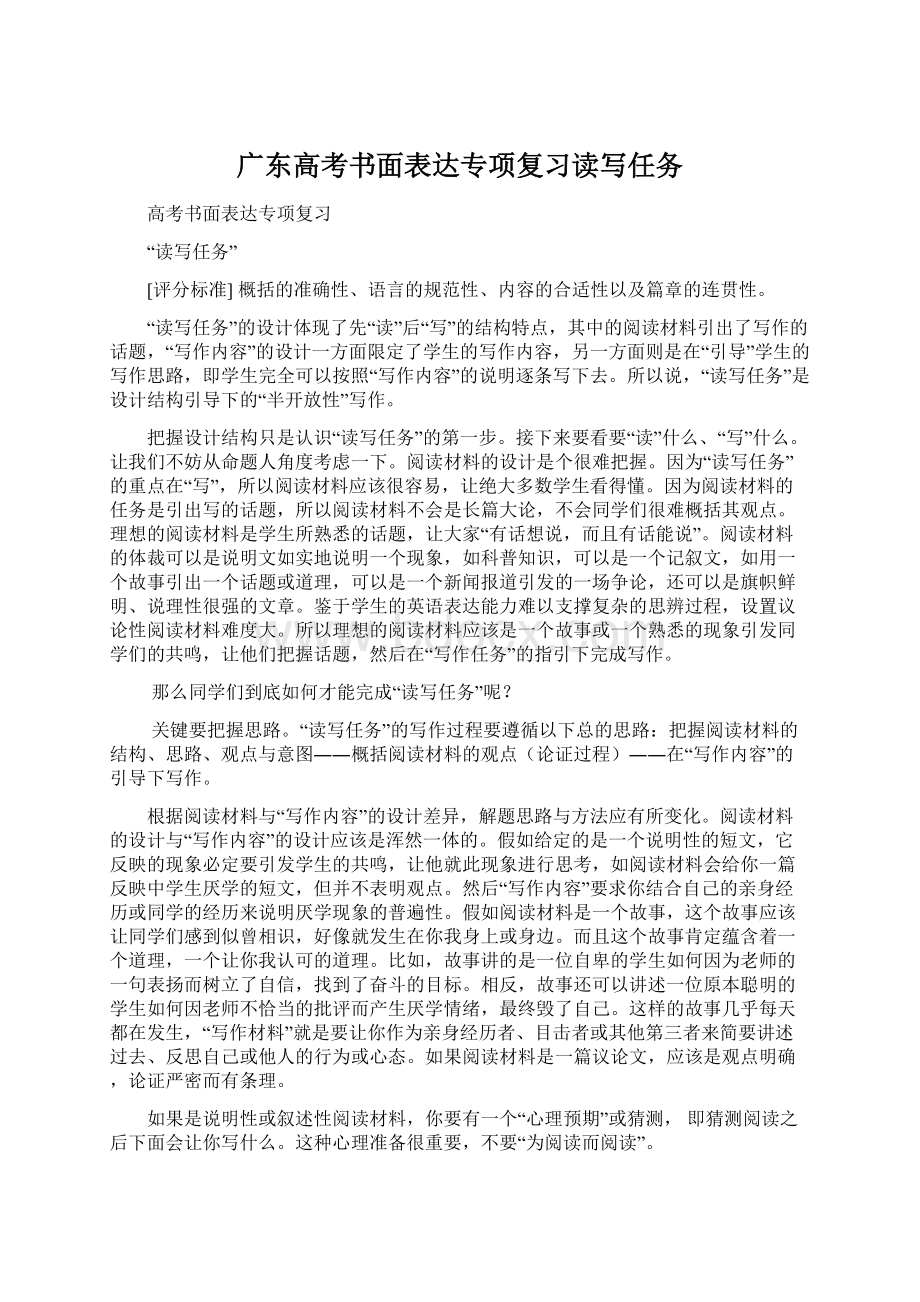广东高考书面表达专项复习读写任务文档格式.docx
《广东高考书面表达专项复习读写任务文档格式.docx》由会员分享,可在线阅读,更多相关《广东高考书面表达专项复习读写任务文档格式.docx(9页珍藏版)》请在冰豆网上搜索。

理想的阅读材料是学生所熟悉的话题,让大家“有话想说,而且有话能说”。
阅读材料的体裁可以是说明文如实地说明一个现象,如科普知识,可以是一个记叙文,如用一个故事引出一个话题或道理,可以是一个新闻报道引发的一场争论,还可以是旗帜鲜明、说理性很强的文章。
鉴于学生的英语表达能力难以支撑复杂的思辨过程,设置议论性阅读材料难度大。
所以理想的阅读材料应该是一个故事或一个熟悉的现象引发同学们的共鸣,让他们把握话题,然后在“写作任务”的指引下完成写作。
那么同学们到底如何才能完成“读写任务”呢?
关键要把握思路。
“读写任务”的写作过程要遵循以下总的思路:
把握阅读材料的结构、思路、观点与意图――概括阅读材料的观点(论证过程)――在“写作内容”的引导下写作。
根据阅读材料与“写作内容”的设计差异,解题思路与方法应有所变化。
阅读材料的设计与“写作内容”的设计应该是浑然一体的。
假如给定的是一个说明性的短文,它反映的现象必定要引发学生的共鸣,让他就此现象进行思考,如阅读材料会给你一篇反映中学生厌学的短文,但并不表明观点。
然后“写作内容”要求你结合自己的亲身经历或同学的经历来说明厌学现象的普遍性。
假如阅读材料是一个故事,这个故事应该让同学们感到似曾相识,好像就发生在你我身上或身边。
而且这个故事肯定蕴含着一个道理,一个让你我认可的道理。
比如,故事讲的是一位自卑的学生如何因为老师的一句表扬而树立了自信,找到了奋斗的目标。
相反,故事还可以讲述一位原本聪明的学生如何因老师不恰当的批评而产生厌学情绪,最终毁了自己。
这样的故事几乎每天都在发生,“写作材料”就是要让你作为亲身经历者、目击者或其他第三者来简要讲述过去、反思自己或他人的行为或心态。
如果阅读材料是一篇议论文,应该是观点明确,论证严密而有条理。
如果是说明性或叙述性阅读材料,你要有一个“心理预期”或猜测,即猜测阅读之后下面会让你写什么。
这种心理准备很重要,不要“为阅读而阅读”。
现在展开说明解题思路:
第一、把握阅读材料的结构、思路、观点与意图。
例:
(1)Almosteverystudenthasdayswhentheydon'
tfeellikegoingtoschool.
(2)Itisnotunusualforsomeofthemsometimestopretendtobefeelingillandgettheirpoorparentsfooled,whomaycalltheschool,askingtheirkidstobeallowedtostayathomeforadayortwo,butsometimesthesestudentsmakeplanstomeetupwithfriendsorgosomewherealonefortheday.(3)Stillsomeotherstudentsmakeashowofgoingtoschoolasusual,ortheirparentsthinktheydo.(4)Thenwhentheyarealoneonthewaytheygoofftosomeotherplacesbyhimselforwithafriend.(5)Schoolscallthistruancy.(6)Kidscallit‘waggingschool'
‘skivingoff'
andallsortsofothernames.(7)Whatdoyoucallitwhereyoulive?
(8)Nomatterwhatyoumaycallit,moststudentsneverdoitandalotofschoolsnowadayshaveverystrictrulestostoptruancyinordertokeepkidssafeandhelpthemtomakethemostoftheirchancetolearnatschool.
可以看出阅读材料反映的是逃学这一现象,但是并没有明显的观点。
(1)是说明厌学情绪的普遍性“almosteverystudent”,
(2)—(4)是逃学现象的具体表现,(5)—(6)指出这一现象学校与学生各有其叫法,(7)—(8)则是要你引起注意,同时表明校方的态度。
例2:
2007年广东省高考英语试题改革方案样题
(1)Letchildrenlearntotheirownwork.
(2)Achildlearningtotalkdoesnotlearnbybeingcorrectedallthetime;
ifcorrectedtoomuch,hewillstoptalking.(3)Henoticesathousandtimesadaythedifferencebetweenhislanguageandothers’language.(4)Bitbybit,hemakestherightchangestomakehislanguagelikeotherpeople’s.(5)Inthesameway,childrenlearntodoalltheotherthings.(6)Theylearntotalk,run,climb,rideabicyclebycomparingtheirownbehaviorswiththoseofmoreskilledpeople,andslowlymaketheneededchanges.(7)Butinschoolteachersnevergiveachildachancetofindouthismistakesforhimself,evenfewerchancesforhimtocorrecthimself.(8)Theydoitallforhim.(9)Teachersactasifthestudentwouldnevernoticeamistakeiftheydidnotpointoutittohim.(10)Theyactasifthestudentwouldnevercorrectitunlesshewasmadeto.(11)Soonhebecomesdependentontheteacher.(12)Letthestudentdoithimself.(13)Lethimworkout,withthehelpofotherchildrenifhewantsit,whatthiswordmeansandwhattheansweristothatproblem.
阅读材料是议论性短文,短文具有完整而缜密的论证过程:
论点、论据、结论俱备。
其中
(1)为论点,
(2)-(11)为论证部分,(12)-(13)为结论。
值得注意的是,所给短文的论证部分是从正反两方面进行论证的。
(2)—(6)为正面论据,(8)—(11)为反面论据。
所给短文的说理思路可以整理如下:
1论点:
(1)
2论据:
1)正面论据:
a.
(2)—(4)b.(5)—(6)
2)反面论据:
(8)—(11)
3结论:
(12)-(13)
理清议论性短文的结构与思路,其观点与写作意图自然“图穷匕见”。
本阅读材料是认为学生的学习错误应该由学生自己来纠正,老师不能干预。
带着这样的思路与理解便可以进入第二阶段——概括阅读材料。
第二、概括阅读材料
如果给定的阅读材料是一则故事,应该用最简练的语言来说明故事讲述了什么,不能拖泥带水讲细节,而且最好讲出故事给你的启示或其中的一个道理。
比如说,Thisstorytellshowateacher’swordofsavedashyandunconfidentchildandhelpedhimfindhimselfandholdontohisdreams.Ittellsusthatteachers’wordscanmakedifferencetoachild’slife.
如果是说明性或描述性短文,如上面本人所给的设计范文,你就必须用概括性的文字说明逃学这一现象。
比如,可以概括如下Thisarticlepointoutthecommonphenomenon——playingtruancy----amongstudents.Italsogivesusapictureoftheformstruancytakes.Finally,ittellstheattitudeonthepartoftheschools.
如果是议论性的阅读短文,则要尽可能客观简要地转述阅读材料的观点。
还是以2007年广东省高考英语试题改革方案样题为例:
概括对方观点首先是要转换视角,即以“第三人称”或“无人称”来概括。
本材料的观点是
(1)Letchildrenlearntojudgetheirownwork..如果换成第三人称就是Thewriterofthisarticlethinksthatchildrenshouldlearntojudgetheirownwork/correcttheirownmistakes. 或者你认为本材料的观点代表了一些人的思想,就可以说Somepeoplethinkstudents’mistakesshouldbecorrectedbythemselvesanditiswrongfortheteacherstodoitforthemtooofteninschool.Itwillmakethechildrendependentontheteachers. 还可以从中立的角度或用“无人称”的方式来说Thearticlegivestheviewthatteachersshouldstopcorrectingstudents’mistakesforthem.Studentsareabletocorrecttheirownmistakesandteachers’frequentcorrectionwillmakechildrenunabletojudgetheirownwork.
如果这一部分要求用30个左右的词来概括,上述概括就是点到为止的高度概括。
如果是用60左右的词来概括,我们就必须对阅读材料的整个说理过程做出概括,即概括其观点、论证过程和结论。
下面试概括作者的说理过程:
阅读材料的观点是Letchildrenlearntojudgetheirownwork,
可以概括为Somepeoplethinkthatteachersshouldnotcorrectstudents’mistakesforthem.
其正面论据为
(2)Achildlearningtotalkdoesnotlearnbybeingcorrectedallthetime;
ifcorrectedtoomuch,hewillstoptalking.(3)Henoticesathousandtimesadaythedifferencebetweenhislanguageandothers’language.(4)Bitbybit,hemakestherightchangestomakehislanguagelikeotherpeople’s.(5)Inthesameway,childrenlearntodoalltheotherthings.(6)Theylearntotalk,run,climb,rideabicyclebycomparingtheirownbehaviorswiththoseofmoreskilledpeople,andslowlymaketheneededchanges.
可以概括为Childrenlearnbycomparinghisbehaviors,includinglanguage,withthoseofmoreskilledpeople.
阅读材料的反面论据是(7)Butinschoolteachersnevergiveachildachancetofindouthismistakesforhimself,evenfewerchancesforhimtocorrecthimself.(8)Theydoitallforhim.(9)Teachersactasifthestudentwouldnevernoticeamistakeiftheydidnotpointoutittohim.(10)Theyactasifthestudentwouldnevercorrectitunlesshewasmadeto.(11)Soonhebecomesdependentontheteacher.
可以概括为Teachers’frequentcorrectionofstudents’mistakesmakesstudentsunabletojudgetheirownwork.
阅读材料的结论为(12)Letthestudentdoithimself(13)Lethimworkout,withthehelpofotherchildrenifhewantsit,whatthiswordmeansandwhattheansweristothatproblem.
可以概括为Sothosepeopleencouragestudentstolearnbycorrectingtheirownmistakesinsteadofhavingtheirmistakescorrectedbytheirteachers.
第一部分整理如下:
(1)Somepeoplethinkthatteachersshouldnotcorrectstudents’mistakesforthem.
(2)Childrenlearnbycomparingtheirbehaviors,includingtheirspeech,withmoreskilledpeople.(3)Teachers’frequentcorrectionofstudents’mistakesdependentstudents.(4)Sochildrenshouldlearnbycorrectingtheirownmistakesandhelpingeachotherinsteadofhavingtheirmistakescorrectedbytheirteachers.(55words)
至此,概括阅读材料的任务就算完成了。
第三、在“写作内容”框架的引导下完成写作。
这一部分同学们应该有较大的自由空间。
如果是就某一现象要你表态,理想的设计是先问这种现象是否在你的身边或身上发生过,当初为什么你要那样做,当初有何感想,现在反思又有何体会。
比如说写作内容会问你/你的朋友是否有逃学的经历,简单叙述一下经历,说说当初的动机、事情的结果,谈谈现在的感受与态度。
这样的结合经历讲问题应该不难,因为同学们每个人都有话可说。
试以“逃学(playtruancy)”为例说明如何在“写作内容”的引导下完成写作过程:
引导1:
你有过逃学么?
你可以说ImustsaythatsometimesIcutschool.注意,这里不是不是提出观点,而是承认一种事实。
引导2:
然后简要讲述一次逃学的经历OnlylastFriday,ImissedtwoEnglishclassesonpurposeandgothome.Asmyparentsareattheirworkplacesatnoon,IenjoyedmyselfwatchingTV.
引导3:
当时的感受?
ItfeltreallycooltothinkthatIwasalonehavingafreetimewhiletheotherpoorchildrenwerelearningtheboringEnglish.
引导4:
逃学的原因?
Whyplaytruancy?
Schoolworksometimesisreallytoomuchandyouwanttogetitoffyourmind.
引导5:
有何担忧?
Ofcourse,I’mafraidwhenteachersandmyparentsfindout,Iwillbein trouble.
引导6:
有何反思?
MaybeIshouldkickoffthishabitsoon.
这一部分整合如下:
ImustadmitthatIdocutschoolonceinawhile.OnlylastFriday,IcuttwoEnglishclassesandwenthomewithouttellinganyone.Withmyparentsaway,IenjoyedmyselfwatchingTV.ItfeltreallycoolhavingafreetimealonewhiletheotherpoorchildrenwereattendingtheboringEnglishclasses.Whytruancy?
Schoolworkisreallytoomuchandyouwanttogetitoffyourmind.Besides,thatEnglishteacherofoursisreallytoohardonusandhardlyanyofuslikeshisclass.Ofcourse,whenmyteachersandparentsfindout,I’llbeintrouble.I’mworriedaboutmyschoolwork,too.MaybeIshouldkickoffthishabitsoon.(121words)
此部分与前文整合后就是一篇完整的短文:
WhyCutSchool?
Thisarticlepointsoutacommonphenomenon——playingtruancy——amongstudents.Italsogivesusapictureoftheformstruancytakes.Finally,ittellstheattitudeonthepartoftheschools.(33words)
ImustadmitthatIdocutschoolonceinawhile.OnlylastFriday,IcuttwoEnglishclassesandwenthomewithouttellinganyone.Withmyparentsaway,IenjoyedmyselfwatchingTV.ItfeltreallycoolhavingafreetimealonewhiletheotherpoorchildrenwereattendingtheboringEnglishclasses.Whytruancy?
Schoolworkisreallytoomuchandyouwanttogetitoffyourmind.Besides,thatEnglishteacherofoursisreallytoohardonusandhardlyanyoneofuslikeshisclass.Ofcourse,whenmyteachersandparentsfindout,I’llbeintrouble.AndI’mworriedaboutmyschoolwork.MaybeIshouldkickoffthishabitsoon.(121words)
如果阅读材料是议论文,你该如何应对呢?
其一、如果你的观点与阅读材料的观点完全一致。
你应该表态,如Icannotagreewiththeauthormore.或者Isharethisopinion或者ThisisjustwhatIwanttosay或者Ithinktheauthoriscompletelyrightinsayingthat等等。
其二、如果你不完全统一阅读材料的观点,你可以说Thisopinionisonlypartlyright.或者ThereistruthinthisopinionbutIthink…或者Wh